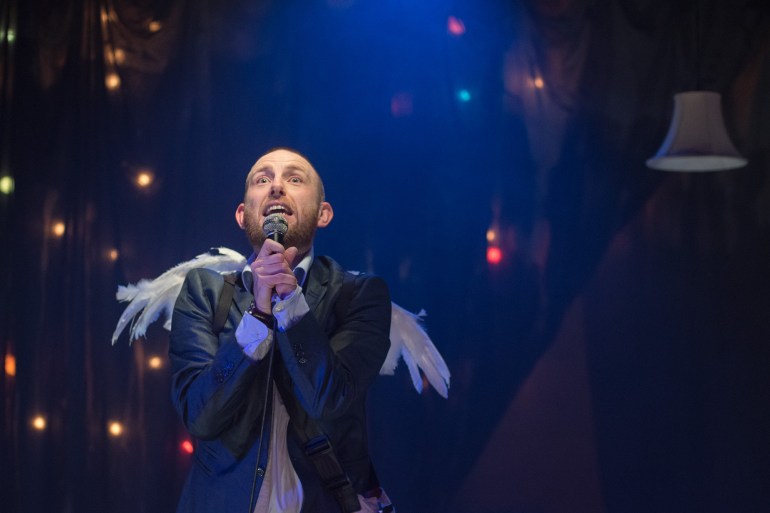Thomas Campbell in Enda Walsh’s play ‘Misterman.’ (Photo: Lucy Parakhina).
Thomas Campbell was performing in a musical recently when a woman approached him in the foyer and asked if he was playing a Vietnam vet.
The actor explained that no, he was cast in the role because the director wanted to work with him.
She was perplexed, seemingly unable to understand that he did not get the part because he was born without a left hand.
The incident confirmed Campbell’s view that while the theatre and screen industries have made great strides in embracing diversity in ethnicities, genders and sexualities, it has a long way to go before people who have, in his words, “non-normative bodies” are widely accepted.
Highlighting the issue in a Facebook post, he said: “I’ve never considered myself disabled, mainly because I was born without my left hand so I know nothing else and have never felt limited in what I can do. I don’t really even like the word as it is reductive.
“My lack of hand is way down on my list of issues as much as people like to suggest it must be very hard. In the last few months though, I’ve stopped laughing off people’s ignorance and allowed myself to become aware that unfortunately as an actor, a lot of ‘general public’ audiences view me as disabled.
“We won’t broaden audiences’ minds if we don’t allow them to see different types of people on stage and screen. Isn’t that what ‘diversity’ is all about? Visibility helps fight stigma. It takes a few forward thinking people in power positions to take that first step and cast outside the box and possibly make audiences feel uncomfortable and deal with new things.
“Unless people with disabilities and in my case, non-normative bodies, become far more visible we will miss out on inspiring young performers with physical differences and achieving inclusion across the board.”
Since graduating from NIDA 15 years ago, the actor has worked steadily on stage, for companies such as the Sydney Theatre Co, the Belvoir, Ensemble and Hayes theatres, and in such TV series as Love My Way, All Saints and Party Tricks.
In 2005 he played the lead as a young Mormon church elder who struggles with his faith when the married woman he has been seeing breaks off their relationship in The Saviour, writer-director Peter Templeman’s short film which was nominated for an Academy Award.
While studying and working in the UK for three years he played a one-handed soldier in Downtown Abbey in 2011- the only time he has played such a character.
At NIDA he did have a prosthetic hand fitted but after graduating he only wore it when auditioning for TVCs. Subsequently he was cast in four major TVCs. Tellingly, after he returned from England he auditioned for a number of TVCs without the hand – and did not get any of those jobs in the past five years.
“I could make assumptions about not getting work because of my hand but I could also make assumptions about getting work because of my hand,” he tells IF. “It all comes down to the people doing the casting.
“We need people in powerful positions, starting with drama school directors, taking in people with different types of bodies and non-normative bodies so they can be trained and we end up ultimately with the best actors.
“At a time when we are really celebrating diversity and placing on stage and screen what we are seeing on the streets, disability hasn’t even entered the conversation.
“We need to get to the point where people are cast for being the best actors and audiences don’t question why they are on the screen or stage.”
Last year he staged a one-man show, wryly dubbed One Hander, which pokes fun at people’s reactions to him, at the Edinburgh Fringe.
“I am a product of where I want the industry to end up,” he concludes. “I am a bit of an anomaly representing an under-represented group of people. I’d like to see more opportunities for people like me who are out there.”


